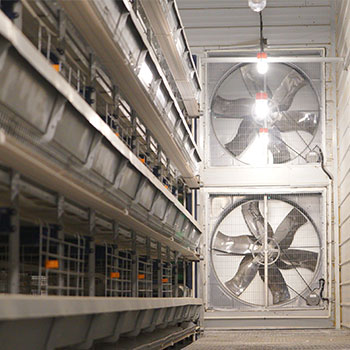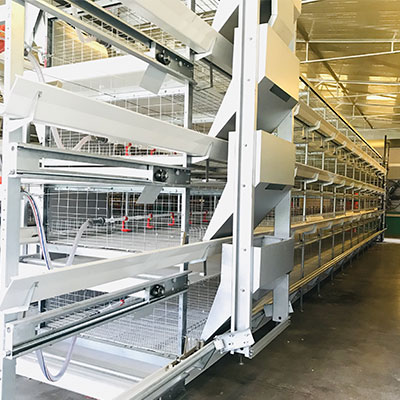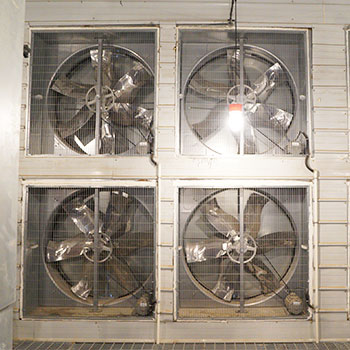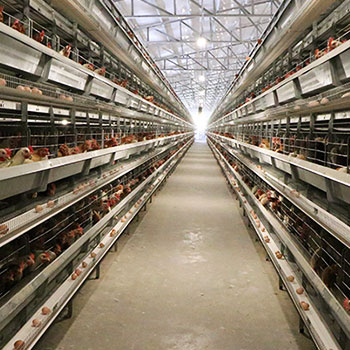Poultry farming in Africa has grown rapidly over the last decade. With increasing demand for eggs and chicken meat, farmers are shifting from small-scale manual operations to more organized, semi-automated systems.
However, one of the biggest challenges in scaling up production is managing the environment inside the poultry house—specifically, waste and air quality.
Manure accumulation, heat, and humidity directly affect bird health and productivity. Inconsistent air movement or poor hygiene can reduce feed conversion efficiency, increase disease risk, and shorten the lifespan of equipment. For this reason, many African poultry farms are adopting automatic manure removal and climate control systems to ensure long-term efficiency and sustainability.

Understanding the Role of Manure Management in Poultry Health
Manure is not simply waste; it is a biological byproduct that contains moisture, nitrogen, and bacteria. When not managed properly, it becomes a source of ammonia and harmful gases, creating poor air quality.
High ammonia levels can:
-
Damage the respiratory tract of chickens
-
Reduce feed intake and growth rate
-
Increase disease incidence
-
Corrode metal cages and shorten equipment lifespan
In modern poultry production, controlling manure accumulation is just as important as feeding or lighting.
An automatic manure removal system allows farms to maintain a consistent cleaning routine, improving air quality and overall flock health.
How an Automatic Manure Removal System Works
An automatic manure removal system consists of several components that operate together to keep the poultry house clean:
-
Manure Belts or Scrapers: Collect droppings beneath each cage row.
-
Motors and Gear Units: Drive the belts at regular intervals.
-
Conveyors or Elevators: Transport manure outside the poultry house.
-
Drying or Composting Area: Allows safe storage or conversion of waste into fertilizer.
Instead of relying on manual labor, this system removes waste quickly and consistently. By minimizing contact between birds and manure, it reduces bacterial load, odor, and insect infestation.
For medium and large-scale farms, this system is essential for biosecurity and labor efficiency.

The Importance of Climate Control in African Poultry Houses
Africa’s poultry sector faces unique environmental challenges: high temperatures, seasonal humidity, and uneven airflow.
Chickens are extremely sensitive to heat stress; even a few degrees of temperature increase can reduce feed intake and egg production.
A poultry climate control system addresses these issues by regulating air exchange, temperature, and humidity through automated equipment such as:
-
Ventilation Fans to remove heat and ammonia gases
-
Cooling Pads to lower temperature through evaporative cooling
-
Curtains and Air Inlets to control airflow direction
-
Sensors and Controllers to monitor and adjust environmental conditions
The system ensures that all parameters—temperature, humidity, air speed—stay within the comfort zone for poultry growth.

Combined Impact on Farm Efficiency
When both systems—manure removal and climate control—work together, they create a cleaner, healthier environment that directly improves performance indicators such as:
-
Feed Conversion Ratio (FCR): Birds consume less feed per unit of weight gain.
-
Egg Quality: Layers produce cleaner, stronger eggshells.
-
Mortality Rate: Lower death rates due to reduced stress and infections.
-
Operational Efficiency: Less downtime for cleaning, fewer labor hours, and smoother farm management.
Clean air and a stable environment also reduce the need for antibiotics and veterinary interventions, supporting sustainable poultry farming practices.
Adapting These Systems to African Poultry Conditions
Modern chicken cage systems can be customized for local climates and infrastructure.
In regions with unstable electricity supply, semi-automatic manure systems and energy-efficient ventilation solutions can maintain performance with minimal power usage.
For farms in hot or coastal zones, corrosion-resistant materials such as hot-dip galvanized steel ensure long equipment lifespan.
Additionally, many African farmers now integrate solar power or hybrid systems to keep automation running during power outages. These local adaptations make advanced poultry systems practical and affordable for different farm scales.
Long-Term Benefits Beyond Hygiene and Temperature
Beyond their immediate impact on cleanliness and comfort, these technologies also contribute to long-term sustainability:
-
Manure Recycling: Dried manure can be used as organic fertilizer, reducing waste and creating additional revenue.
-
Energy Efficiency: Smart controllers minimize unnecessary fan operation, saving power costs.
-
Reduced Environmental Impact: Proper waste handling prevents water pollution and improves community health around poultry farms.
These benefits align with the future direction of Africa’s poultry industry—efficient, sustainable, and environmentally responsible.

Choosing a Reliable Poultry Equipment Partner
Selecting the right equipment supplier is key to achieving consistent results.
Farmers should consider the following factors when choosing a system provider:
-
Proven experience in tropical poultry environments
-
Availability of after-sales service and spare parts
-
Material durability (preferably galvanized or stainless steel)
-
Compatibility with existing cage or house designs
LIVI poultry equipment supplier provides complete manure removal and climate control solutions specifically designed for African conditions.
Our engineering team offers farm layout planning, equipment customization, and technical guidance for installation and maintenance.
Conclusion
Automation in manure handling and climate control is no longer optional for commercial poultry farms—it is a requirement for efficiency, health, and sustainability.
By investing in these systems, African poultry farmers can maintain better production stability, reduce operating costs, and protect both animal welfare and equipment lifespan.
For farms aiming to expand or modernize, a well-designed environmental control system is one of the most valuable long-term investments in poultry production.

